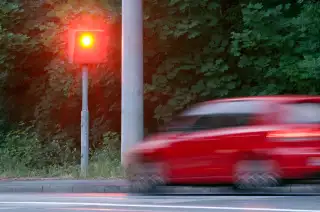Your Red Light Traffic Ticket May Have Just Been Tossed

Tens of thousands of drivers in Florida who were hit with $264 traffic tickets because of violations recorded by cameras installed at red lights are now off the hook. The South Florida Sun-Sentinel reports that two traffic judges in Broward County have tossed 24,000 pending ticket cases because part of the process for issuing the citations violates Florida state law.
"State law mandates that only law enforcement can issue violations," the Sun-Sentinel explains. And yet, an Arizona-based vendor named American Traffic Solutions was responsible for reviewing the footage captured by red light cameras in Florida, and then it forwarded the specifics on to police. Judges ruled that the involvement by the out-of-state party is itself a violation of state law, hence the decision to negate traffic citations worth $6.3 million.
The ruling may seem like a silly technicality, but it actually represents one of many reasons why red light camera programs have come under fire lately. Grassroots driver advocacy groups have been arguing that cities should get rid of red light cameras for years. Critics claim that the fines resulting from red light cameras are often unfair and absurdly expensive (close to $500 in some cases), while also making the case that the presence of cameras at red lights can actually decrease road safety as drivers slam on the brakes when they see them. Some studies indicate that rear-end collisions increase due to the presence of red light cameras.
What's more, scandals have called various red light camera operations around the country into question. In Chicago, a $2 million bribery scheme resulted in the city dropping its contract with one red light camera vendor, while another investigation revealed strange, inexplicable spikes in tickets in certain locations in Chicago, signifying that someone had manipulated how and when citations would be issued.
Over the past week, the Chicago Tribune reported that city officials are aware that the city's "yellow light times are too short for traffic conditions." At the same time, however, the city isn't adjusting yellow light times or speed limits accordingly. "What I see here tells me that in many cases throughout the city the yellow lights are too short and the speed limits are too low," a traffic safety consultant named Hugh McGee said to the Tribune. "It is even more evidence that they want to use these things selectively as a way to collect revenue, unfortunately."
Proponents of red light cameras—most notably, the companies that make money from the Big Brother-like programs—say that their usage absolutely makes roads safer, with traffic fatalities decreasing as the number of communities added cameras to the roadsides.
Still, for a wide range of reasons more and more municipalities are dumping their red light camera programs—including several in Florida during the time that above referenced case made its way through the courts. The state of New Jersey ended its red light camera program at the end of 2014, while officials and driver advocates in New York City have been demanding more transparency to red light camera systems—because there's reason to be skeptical about the claims they actually improve driver and pedestrian safety.